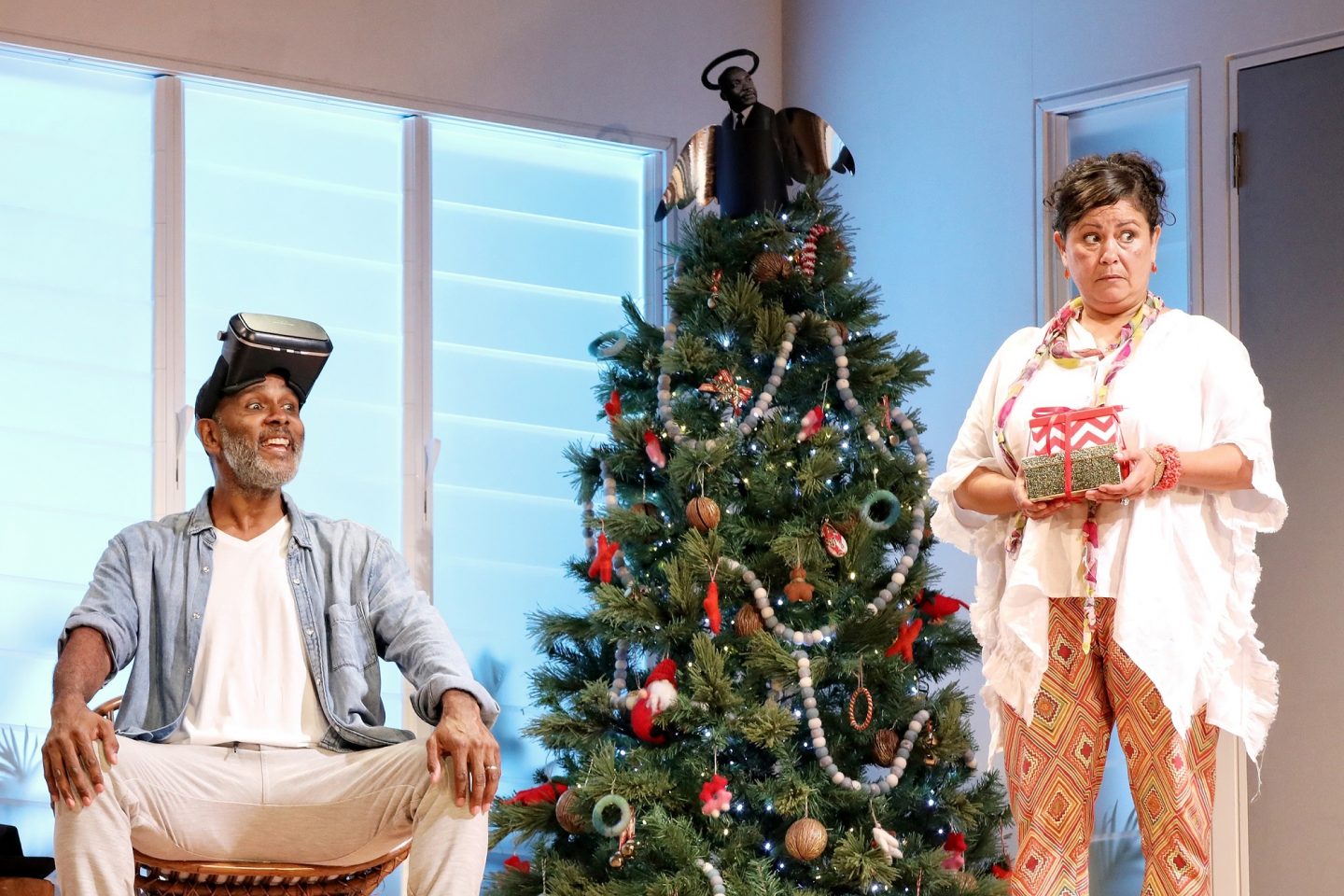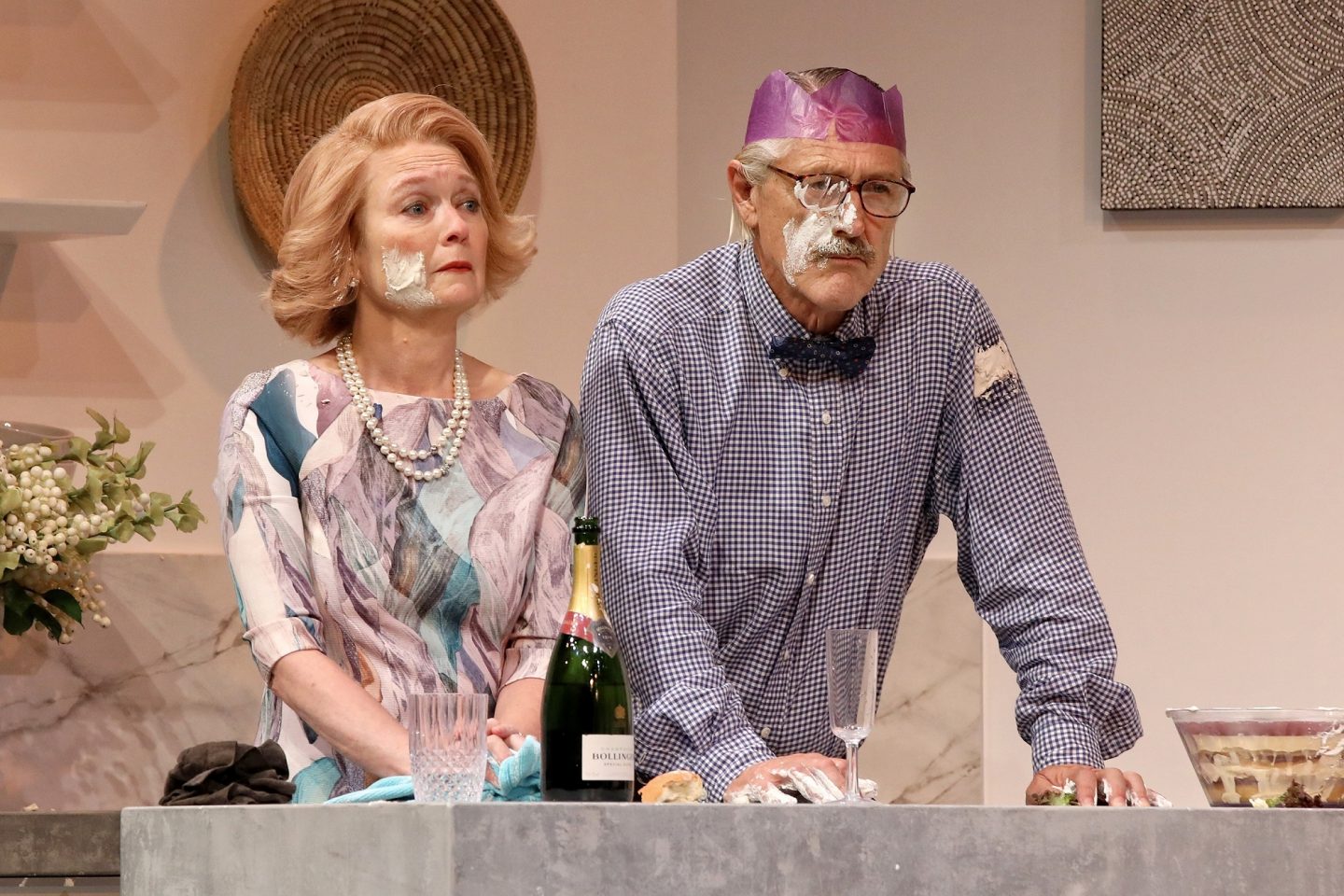Lui’s warm but gleefully shit-stirring sensibility is immediately laid out in a disarming opening riff on cultural appropriation between young couple Charlotte Gibson (Miranda Tapsell) and Francis Smith (Tom Stokes). As the pair wrap presents and brace for a shared Christmas with both of their families, they trade gotcha moments in a playful volley of privilege-checking brinkmanship that makes the audience squirm and howl with laughter in equal measure.
A little help from narrator and ‘Spirit of Christmas’ Luke Carroll sets the scene: Charlotte, a successful young Aboriginal lawyer (Tapsell stepping in for Shari Sebbens, and fresh from her own romantic comedy Top End Wedding) is newly and secretly engaged to her white boyfriend Francis, whose cheap clothes and comically obtuse vocation as a struggling artist (commiserations to any experimental contemporary classical composers in the house) mask the fact that his lifestyle is entirely supported by a trust fund allowance. He has yet to meet Charlotte’s father Ray (Tony Briggs), a retired politician and Aboriginal leader whose 90s heyday has brought him national recognition and financial comfort, but also a legacy of compromise.
Ray of course, owes much of his clout to Charlotte’s mother Joan (Melodie Reynolds-Diarra), who has set her own ambitions aside to provide the backbone to Ray’s political rise (a line about them meeting at a 1980 deaths in custody carries a poignant relevance this week – and indeed, most weeks – with the entire cast seen a few hundred metres away at Wednesday’s Yuendumu solidarity rally). Charlotte’s sister, fashion designer and influencer Rose (Tuuli Narkle), dreams of a Kardashian-style dynasty for her and trailblazing retired rugby player husband Sonny (Anthony Taufa). Sonny’s newfound embrace of the Lord imperils such earthly ambitions, but Narkle and Taufa’s chemistry and warmth sparkles throughout the play.
 Tony Briggs and Melodie Reynolds-Diarra
Tony Briggs and Melodie Reynolds-Diarra
The biggest conflict arrives with Francis’ parents Dennison (Geoff Morrell) and Marie (Vanessa Downin), who are not only white, rich Liberal party scions, but are very much known to the Gibsons. Played by Morrell as a kind of desiccated blend of Kevin Andrews, Tony Abbott and Malcolm Turnbull, Dennison is the long-term political and Twitter nemesis of Ray. The only thing that seems to unite this motley crew is their affluence (something Lui also regularly skewers), but it’s clear things are going to get worse before they get better.
On paper the messy, hazardous web of politics and identities that these six bring to the living room of the Gibson’s handsomely appointed summer house (built, as Ray continually points out, on their ancestral lands) reads like serious social commentary. Which, at times, it is. But Tapsell lends great empathy to Charlotte’s moral crisis as she reels from a recent case that seems like a win, but feels like a loss for the Aboriginal communities she is supposed to be representing. That sense of failure is thrown into stark relief by her own family’s wealth and privilege, and how the inroads her parents have made into mainstream Australia has left others behind.
Related Article
Nakkiah Lui loves soppy love stories, Australian humour and Miranda Tapsell
Then there’s Rose, who is so confident that her sister’s interracial coupling will contribute to the erasure of Charlotte’s Aboriginal identity that you can almost feel Lui holding the other shoe above the stage, waiting for the perfect moment to drop it. Meanwhile, Charlotte’s conflict about being set up to be an “Aboriginal, female Waleed Aly” offers cause for white audience members to reflect on our own expectations and demands of Aboriginal people before granting a seat at the table – a theme Lui and Tapsell explored to great effect in their seminal episode of Get Krack!n earlier this year.
These discussions have nuance and weight as Lui shows that intersecting issues of race, privilege, gender, class and identity are far more than trending buzzwords. Charlotte’s attempts to find a path through the morass of the nation and her family’s legacy show how these ideas have real world outcomes.
These are insightful and important things to see play out on a major South Australian stage. Which makes the next statement all the more impressive: Black Is The New White is perhaps the single funniest thing you could hope to see on a stage or a screen this year. It’s the kind of writing that in any other medium would spawn an entire GIF library of memorable quotes, one-liners and exchanges – even if many of us would be too uncomfortable to casually drop them into the group chat.
 Vanessa Downing and Geoff Morrell
Vanessa Downing and Geoff Morrell
Lui leaves few taboos unprodded, while harnessing an evident love and structural understanding of Richard Curtis-style ensemble comedies. Each character stakes out a different and familiar corner of modern Australian identity, but each of them surprises us in different ways. As Lui brings the characters in and out of focus, and pairs them off to highlight different arcs, it’s testament to the richness and humour of the writing and performances that one can’t help but watch the reactions of characters in the background of a scene. They, like the audience, sit perched on their seat in a mix of horror and amusement.
Directed by Paige Rattray and retaining much of the play’s original 2017 Sydney Theatre Company cast, the staging and arc of this State Theatre Company presented tour occasionally echoes the State Theatre’s 2017 finale Vale. But while Nicki Bloom’s tragicomedy added to the avalanche of necessary but occasionally exhausting studies of toxic masculinity, Lui shows that sometimes un-cynical humour and empathy can be even more illuminating.
From her work on ABC programs like Black Comedy to her periodic conscription into ~the national conversation~ Lui has emerged as a force in modern Australian culture. But for years, FOMO-plagued South Australian audiences have had to be content to view her most engaging body of work – her plays – from afar through the prism of glowing Guardian reviews and bad faith culture warrior attacks. Over two-and-a-half hours that fly by all too quickly, it turns out the substance of Lui’s work is far richer, funnier and thought-provoking than we could have anticipated.
Let’s hope we don’t have to wait as long to see another.
Black Is The New White was performed at Dunstan Playhouse on Thursday 14 November
14 November – 1 December
Black is the New White
Walter is a writer and editor living on Kaurna Country.
Get the latest from The Adelaide Review in your inbox
Get the latest from The Adelaide Review in your inbox